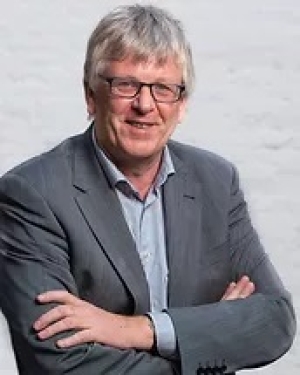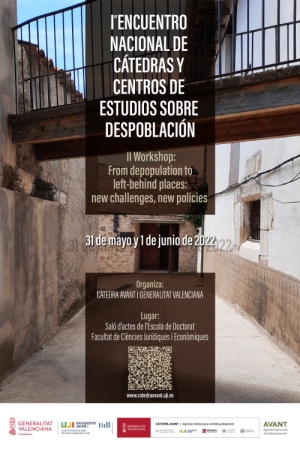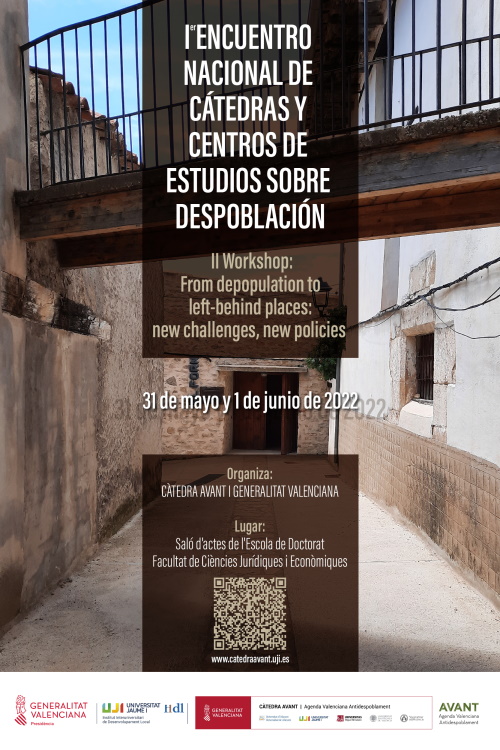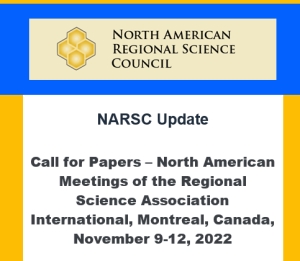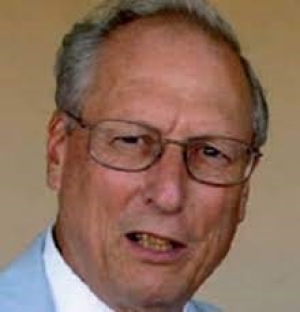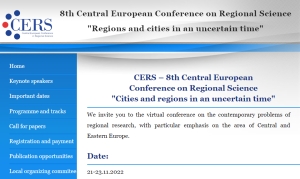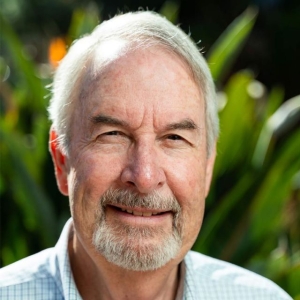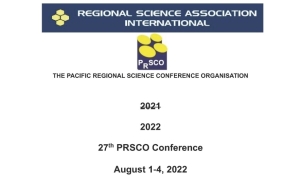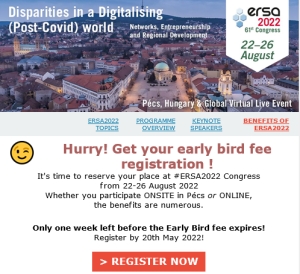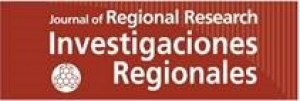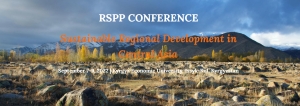News
Elisabete Martins
Winner of the 2022 Hirotada Kohno Award
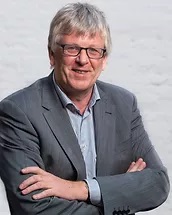 Congratulations to Jouke van Dijk who is the winner of the 2022 Kohno Prize.
Congratulations to Jouke van Dijk who is the winner of the 2022 Kohno Prize.
The Jury (Eduardo Haddad, Chair, Lily Kiminami, Yoshiro Higano, and Geoffrey Hewings) would like to propose that the award for 2022 be made to Professor Jouke van Dijk (University of Groningen).
In similar fashion to Professor Kohno, Van Dijk started his involvement with the Dutch section of RSAI during which time he served as co-organizer and member of the LOC of the ERSA meetings in Groningen in 1982, 1994 and 2017. For the decade of the 1990s, he served as Executive Secretary of the Dutch section with the responsibility for organizing two meetings each year. When Professor Juan Cuadrado Roura became President of ERSA in 1995, he proposed that van Dijk be appointed as Executive Secretary of ERSA and the European Organizing Committee (EOC) and he served in this position from 1996-2001. He remained a member of the EOC for all but three years between 1993 and 2019. From 2007-2019 he served as either ERSA or Papers in Regional Science representative on the RSAI Council. During this period, he also served as President of the European Regional Science Association (ERSA) from 2014-2018.
In addition to his section/ERSA/RSAI duties, he also served in an editorial capacity. He was Editor-in-Chief of the Papers in Regional Science, 2007-2012; prior to this, he was the European Editor of Papers in Regional Science, 2005-2007. In 2012, he was appointed as one of the editors of the Springer Regional Science Series Advances in Spatial Science. In these positions, he has helped advance scholarship, especially of younger scholars, to print.
In all of these positions, he worked tirelessly to enhance the quality and participation of sections in ERSA and he managed to enhance the stature of PiRS through his work in soliciting the best papers from conferences and generating a sense among authors that this was a journal of increasing prestige. He has also enhanced RSAI/ERSA’s visibility in the EU DG REGIO division by organizing a lecture series and University workshops at the annual European Week of Regions and Cities. He was also an initiator in promoting the participation of ERSA in the Masterclass for young scholars and University workshops at the annual European Week of Regions and Cities (EWRC, former Open Days) co-organized with EU DG REGIO in Brussels; each year, over 6.000 participants attended from regions all over Europe. In addition, Co-founder and co-organizer of the series of annual International Workshops on ‘Regional, Urban, and Spatial Economics’ (RUSE) in China. He has promoted regional sections within Europe as a member of the Editorial Board Review of Regional Research (Jahrbuch für Regionalwissenschaft) since 2013 and as a member of the International Scientific Board of Investigaciones Regionales, the review of the Spanish Association, since 2014. Further, he has served on juries for prizes, organized congresses, round tables, and well as being an active participant at congresses and meetings, in numerous European sections (French Speaking., German Speaking, Greek, Italian, Spanish, Hungarian, and in the Nordic countries). These are contributions that are often overlooked but turn out to be critical in creating a sense of community among regional scientists.
Over three decades, Professor van Dijk has demonstrated a continuing, sustained commitment to enhancing the organization of regional science in his various leadership capacities. ERSA is now one of the strongest of the multinational organizations within RSAI; prior to COVID, attendance of 800-1,000 at the annual meeting was not unusual. Through his leadership and dedication, Professor van Dijk has made a difference that has promoted and enhanced Regional Science and the Jury feels that he would be a most deserving recipient of the Hirotada Kohno Award for Outstanding Service to Regional Science.
II Workshop: From depopulation to left-behind places: new challenges, new policies, 31 May-1 June, 2022, Universitat Jaume I, Spain
NARSC 2022 - Montreal, Live and In Person!
|
||||||||||||||||||||||||||||||||||||||||
|
||||||||||||||||||||||||||||||||||||||||
In Memoriam: Professor Arthur Getis (July 6, 1934 – May 13, 2022)
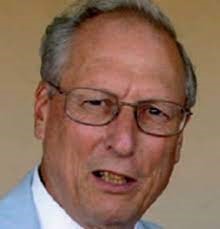
On May 13, 2022, RSAI lost one of its intellectual heroes. Arthur Getis, born in Philadelphia, passed away at the age of 87. Arthur Getis was the President of WRSA in 1999 and an active participant in RSAI Congresses around the world for several decades. He was President-Elect of the University Consortium for Geographic Information Science in 2001 and has served on several university faculties, including San Diego State University (1990–2004), the University of Illinois at Urbana-Champaign (1977–1990), Princeton University (1971–1974) and Rutgers (1963–1977). He worked for briefer time periods at Harvard with Walter Isard, the father of Regional Science.
Arthur received his BSc and MSc degrees from Pennsylvania State University. He earned his Ph.D. focused on the theoretical and empirical inquiry into the spatial structure of retail activities from the University of Washington in 1961. His Ph.D. thesis highlighted his primary research focus on understanding how individual behaviors manifest in spatial patterns.
At Rutgers, he wrote the classic book, Models of Spatial Processes with his student Barry Boots. The book, published in 1978, is still cited as representing fundamental concepts about geographic space. While at Rutgers, he became known for his seminal work on the nature of point patterns, where the patterns represent objects in geographic space. He pioneered and helped develop the field of spatial analysis at Rutgers University's Livingston College and laid the groundwork for developing spatial studies at Princeton University.
In 1977 Arthur left the Chairmanship at Rutgers to head the Department of Geography at the University of Illinois at Urbana-Champaign. During those years, he worked on papers that significantly contributed to the literature on patterns of spatial association patterns, K-function analysis, and urban research.
Arthur moved to San Diego State University in 1990, where he directed the joint Ph.D. Program with the University of California at Santa Barbara and then served as the Birch Chair of Geographical Studies. At the same time, Arthur collaborated with Keith Ord, an internationally known statistician, to produce a new family of spatial statistics called local spatial statistics, as opposed to the global statistics such as Moran's and Geary's autocorrelation statistics. These statistics became known as Getis-Ord G statistics, applied in several fields using spatial data, including public health. Arthur used these statistics in his research on the transmission of dengue fever in Peru and Thailand, supported by the US National Institutes of Health. The US National Institute of Child Health and Human Development supported his seminal research on public health in Ghana.
His ground-breaking methodological papers with Keith Ord on The Analysis of Spatial Association by Use of Distance Statistics and Local Spatial Autocorrelation were published in Geographical Analysis 1992 and 1995, respectively. These contributions have sparked some of the most exciting developments in spatial statistics and regional science, generating Arthur's world-renowned reputation. The numerous Google citations of these papers attest to his scholarly impact and global influence. The Getis-Ord statistics are now widely used by researchers worldwide to study patterns of the diffusion of disease, spatial clustering of economic attributes, and the grouping tendencies of land uses when spatial data sets are enormous.
And at San Diego State University, he has been primarily influenced by the technical advances in developing geographic information systems (GIS). In this new field, he has published several papers, collaboratively with Luc Anselin from UCSB (University of California, Santa Barbara), that yielded unique insights into the spatial analytical potential of the new technology. He also collaborated with Michael Goodchild, the leading GIS researcher at UCSB, on the broader dissemination of foundational GIS materials at workshops around the US.
Arthur Getis was (elected) Secretary of the 500-person Commission on Mathematical Models of the International Geographical Union (1988–1996). As Chairman of this Commission, I have had the great pleasure of closely collaborating with him, planning scholarly meetings in Canberra, Shanghai, Beijing, Prague, Bratislava, Odessa, The Hague, Boston, Washington, and Princeton, and engaging in developing research relations between members from different parts of the world. We also joined forces to launch a new methodology publication outlet in 1994, the Journal of Geographical Systems (and its predecessor Geographical Systems). Arthur Getis served as one of the editors-in-chief and then as an honorary editor. One of the distinctive features of this journal is its distinct focus on the interface between modeling, statistical techniques, and spatial issues in a broad spectrum of related fields.
Arthur's professional interests in education synchronized with his wife, Judy. Arthur and Judy won the National Science Foundation's Post-Sputnik High School Geography Project, designed to improve geographical education in America's schools. Their interest in education led to the publication of a leading textbook on geography with co-author Jerome Fellman. This foundational geography textbook in the United States is now in its 18th edition, a testament to its relevance today.
Arthur was the recipient of a long list of awards, amongst them were the Fellows Award (2005), the Jean-Paelinck Award (2017), the Founder's Medal (2012) from the RSAI, the Walter Isard Award for Distinguished Scholarship from NARSC, and the Aageenbrug Award for Career Achievements (2008) from the GIScience Specialty Group of the Association of American Geographers. These awards recognize the attainment of outstanding scholarly excellence and demonstrate his international recognition in regional science, geography, and GIScience.
Arthur Getis has been not only a brilliant regional scientist but also a magnificent human being –a dedicated teacher, admired by his students, an impressive scholar, committed to the ideals of academia, highly respected by his colleagues, a gentle and generous spirit, and warm and sensitive human personality. Arthur was a wonderful friend to many of us. His passing is a tragic loss to the regional science community, and we shall greatly miss but certainly not forget him.
Art leaves behind his children, Hilary GetisTarazi, Victoria Lynn Getis (Boyle) and Anne Patterson Tibbetts. And seven grandchildren, Abigail Grace Boyle, Sophia Noel Tarazi, Hannah Claire Boyle, Christina Hope Tarazi, Darby Constance Tibbetts, Trevor Patterson Tibbetts, and Matthew Getis Tibbetts.
Manfred M. Fischer
Professor Emeritus, Vienna University of Economics and Business
8th Central European Conference in Regional Science, November 21-23 2022 – SAVE THE DATE!
Dear Colleagues!
We are pleased to invite you to participate in the 8th Central European Conference in Regional Science (CERS) 'Resilience of cities and regions in an uncertain time'. The conference hosted by the Faculty of Human Geography and Planning at Adam Mickiewicz University, Poznań, Poland will be held on 21st-23rd November 2022 in a virtual formula. The conference is co-organized with European Regional Science Association – Polish Section, Hungarian Regional Science Association and Slovak Section of ERSA.
CERS have a long tradition and is organized every 2-3 years in one of the Visegrad countries. The previous edition of the conference was held in Sopron, Hungary in 2019. The idea of the conference is to promote research in the field of Regional Science. It is also a good point for the consolidation of many groups of scientists working on human and economic geography, spatial management, spatial economy, regional and urban economy, demography, spatial planning, architecture, and ecology.
We are happy to announce two distinguished keynote speakers: Jean Claude-Thill (University of North Carolina at Charlotte) and Kostyantyn Menzetsev (Taras Shevchenko National University of Kyiv).
The leading concept of the 8th CERS conference is to facilitate a welcoming forum for a presentation of academic research and the exchange of ideas, concepts, experiences, and different points of view.
Main themes of the conference:
- Contemporary and future challenges for cities and regions: Are we ready for them?
- Cities and regions facing the economic crisis and global epidemic,
- Cities and regions in climate change,
- Circular economy for resilient cities,
- Uncertainty in local and regional policies,
- Urban and regional development,
- Demography, migration and social inequalities,
- Innovation, entrepreneurship and regional competitiveness,
- Spatial planning, sustainable development and ecological transition,
- Rural regions and their development,
- Culture, tourism, health and education in an uncertain time,
- Land use, transport, mobility and accessibility,
- Perspectives on shrinking cities development,
- Regional finance, fiscal issues, investment and capital markets,
- The digital world, digital region and digital society,
- Methods and models in regional science and urban economics,
- Ukraine and CEE countries in the face of war.
We warmly invite you to organize one of the sessions during the conference. The call for Special Sessions is open now. Please submit your proposal via the registration form available here.
For more detailed information, please visit the conference website. More information will be available soon.
Hoping to see you at CERS!
Richard Church has been elected as a member of the US National Academy of Sciences.
Richard Church has been elected as a member of the US National Academy of Sciences.
Rick has been a major presence in regional science since presenting one of his first conference papers at the 1973 meetings of the North American Regional Science Council held in Atlanta, Georgia, USA (November 9-11, 1973). This paper was subsequently published in Papers of the Regional Science, formerly Papers of the Regional Science Association (Church, R. and C. ReVelle, 1974, “The maximal covering location problem”, Papers of the Regional Science Association 32, 101-118), one of the most highly cited regional science publications. He has made important and sustained academic contributions to regional science, particularly in the areas of location science, spatial optimization, natural resource management and transportation. Reflecting this are a long list of distinctions and awards, including Fellow of the Regional Science Association International (2009), Isard Award for Scholarly Achievement for the North American Regional Science Council (2018), Alonso Memorial Prize for Innovative Work in Regional Science from the North American Regional Science Council (2019) as well as Fellow of the American Association for the Advancement of Science (2009), Lifetime Achievement Award from the Section on Location Analysis of the Institute for Operations Research and the Management Sciences (2012) and the UCGIS Research Award (2014), among others. Worth mentioning as well is his important service to regional science, which includes President of the North American Regional Science Council (2015) and President of the Western Regional Science Association (2021-2022).
Congratulations Rick on your election to the National Academy of Sciences, and your continued contributions to regional science!
Extended deadline: May 31 Call for presentation to PRSCO 2022 online
Call for presentation to PRSCO2022 online extended to May 31.
The deadline for registration for presentations at the PRSCO2022 Kyoto International Convention, to be held August 1-4, 2022 (online), has been extended to May 31.
The registration fee for making a presentation is 100 USD (OECD case) for regular members of the Japan Association of Regional Studies and 70 USD for student members.
For co-authors, discussants, and audience members, the registration fee is 50 USD (OECD case) for regular members and 35 USD for student members of the Japan Society of Regional Studies.
PRSCO2022 was scheduled to be held in Kyoto, but due to the Corona Disaster situation, it will be held online. In consideration of the time difference between Asia and the U.S., you may submit your first and second choices for presentation times from 6:00-9:00 a.m., 10:00-12:00 a.m., and 13:00-16:00 p.m. JST.
In addition to general presentations (20-minute presentations with 15-minute Q&A sessions), there will also be an Early Bird session, a 10-minute presentation with 5-minute comments for graduate students, and a Nurturing young Talent session as next generation fostering program for graduate students. Applications for Special Session are also being extended to May 31.
1) To register for a presentation, regional society members in your country must first register themselves online at https://sites.google.com/view/prsco2022/
2) If you wish to make a presentation, please enter the title of your presentation, abstract (200-250 words), keywords, and JEL code from the registration screen at Contribution after logging in by May 31.
3) After peer review by the Scientific Committee, full papers (6-8 pages) in the website format are due on June 30.
The abstracts will be compiled in the online Proceedings together with the program as pdf data.
If your paper has already been published or presented in your local language, you may present it in English with the source listed in the previous publisher, after consulting with us by e-mail, provided that you have obtained permission for secondary publication from the previous publisher and permission to translate the figures and tables for publication. These full papers will be shared with participants on the share drive, but will not be published as proceedings. Because this means that although some of the authors' previous work will be included and cited at a later date, new findings and data added through research and additional content will require a revision of the title, including the conclusion, so we encourage you to submit your paper to AJRSA as an original research paper. The maximum length of a full paper is 8 pages, and the maximum length of a full PRSCO 2022 paper is 14 pages or more to avoid multiple submissions and self-plagiarism.
Organizing Committee encourages all members of the PRSCO members to make presentations.
For inquiries or to apply for a special session, please contact This email address is being protected from spambots. You need JavaScript enabled to view it. .
PRSCO2022 online conference Kyoto Conference Organizing Committee Chair Hidehiko Kanegae
ERSA2022 Congress | Only one week left for early fees
|
New Issue 52 of Investigaciones Regionales - Journal of Regional Research
We have issued the 52nd volume of Investigaciones Regionales - Journal of Regional Research, following the philosophy of the journal of accommodating papers with the diversity of disciplines within Regional Science.
The current issue opens with the paper titled “Subnational Multidimensional Poverty Dynamics in Developing Countries: the cases of Ecuador and Uruguay” and authored by Moisés Obaco, Nicola Pontarollo y Rodrigo Mendieta. This paper studies deprivation dynamics at the subnational level, introducing a Local Multidimensional Poverty Index (LMPI) in Ecuador and Uruguay between the last two available censuses, 1990–2010 and 1996–2011, respectively. The authors construct the index at the municipal level using microdata from both counties. Subsequently, they explore spatial and temporal dynamics through a set of tools such including the salter graph, spatial statistics and a spatial transition matrix. The results indicate that compared to Ecuador, Uruguay was initially in a better position in terms of deprivation. However, Ecuador achieved a generalized reduction of the index during the period of analysis, reaching levels close to that of Uruguay.
The theory of fuzzy sets provides a referential framework for measuring poverty under a multidimensional approach. This theory replaces the poor or non-poor dichotomy, by the gradual belonging to the group of the poor. This is the starting point of the article from Diego F. García-Vélez and José Javier Núñez, and titled “An alternative approach to measure multidimensional poverty using fuzzy sets: spatial analysis for Ecuador”. The objective of the research is to propose an alternative method for measuring multidimensional poverty in Ecuador. Three poverty rates are developed using fuzzy sets and the capabilities approach, in addition, a spatial analysis of poverty is carried out at the provincial level. The main results show that public policies must be prioritized towards housing and work, and no spatial dependency or multidimensional poverty clusters are identified.
Víctor Manuel Bellido-Jiménez, Domingo Martín-Martín, and Isidoro Romero are the authors of the paper titled “Self-employment in immigrants and the survival of incubated businesses in Andalusia”. They investigate This paper investigates the existence of specific patterns of survival in the case of the businesses created by self-employed immigrants compared to those driven by national self-employed. The analysis uses a database made up of all the businesses incubated by public support services developed by the Andalucía Emprende Foundation (Ministry of Employment, Training and Self-employment of the Regional Government of Andalusia) in the period 2009-2014. The results show that the chances of survival of immigrant businesses are lower than that of national promoters even after controlling for territorial characteristics, the characteristics of the business projects and the personal characteristics of the self-employed. It is also observed that the educational level of promoters increases business survival, having a significantly larger effect in the case of the immigrant self-employed.
The next article is a case study focused in Ecuador and signed by Grace Carolina Guevara, Jonathan Rafael Quijia, José Fernando Ramírez and Oscar Omar Acero. In “Do the novelty and type of innovation affect the performance of firms? A case study for Ecuador” they measure the causal effect of innovation on firms’ productivity by distinguishing the type of innovation, namely, in products, in process, in organization and in marketing. To do so, an endogenous switching model is estimated using the Science, Technology and Innovation Activity Survey. The results indicate that the productivity loss is higher for innovating firms if they stop innovating than the productivity gain of non-innovating firms if they engage in innovation. The difference between the productivity losses and gains depends on the type of innovation.
Next, the article “Towards a model of territorial governance for a locally-based inclusive approach: the regional experience of Beterri-Buruntza”, signed by Andoni Zulaika, Víctor Sánchez and Felix Arrieta, evaluates the reform of the institutional structures of protection systems, aiming at reconcile the increased pressure on protection systems with their sustainability, but also to improve their efficiency and proximity to citizens. Recently, Gipuzkoa has promoted the revision of the territorial governance model to improve care for people in situations of exclusion and vulnerability. This article looks at the main limitations of the new regional governance model for improving social inclusion, identifying some lessons that can be extended to other territories that carry out similar processes. These should especially include the need for a clear public commitment and leadership, and a commitment to professional figures and structures of a county and/or local nature that coordinate resources and social agents.
Finally, Osvaldo Meloni authors the work “Feeding the Leviathan: political competition and soft budget constraints. Evidence from Argentine subnational districts”. This paper presents evidence of the influence of political competition on the behavior of fiscal policy in Argentine provinces from 1987 to 2015. Contrary to the predominant theory and empirical evidence from subnational districts the estimations of a dynamic panel data show that political competition is associated with increases in public outlays and changes in its composition. This finding is strongly related to the large vertical fiscal imbalances that characterize the Argentine fiscal federalism. He authors conjectures that governors use the additional low-cost spending power given by federal transfers to feed clientelistic networks, increase public employment and direct subsidies to constituencies, thus enhancing their chances to remain in office.
The volume also includes a work devoted to European Regional Policy, in this case a note, “Cohesion Policy in Europe", summarizing the highlights of the eighth cohesion report, on report on the economic, social and territorial cohesion of the European Union, which has recently come to light.
To contact Us and Submit Manuscripts:
Investigaciones Regionales – Journal of Regional Research
Email: This email address is being protected from spambots. You need JavaScript enabled to view it.
The article will be sent through the portal Open Journal System (OJS) of the Spanish Repository of Science and Technology (RECYT): https://recyt.fecyt.es/index.php/IR/login
ISSN: 1695-7253 E-ISSN: 2340-2717
RSPP CONFERENCE, Sustainable Regional Development in Central Asia, September 7-9, 2022 | Kyrgyz Economic University, Issyk-Kul, Kyrgyzstan
The Regional Science Policy and Practice (RSPP) Conference on Sustainable Regional Development in Central Asia mobilizes members of the Editorial Team of the journal and the Regional Science Association International and encourages to participate in this Central Asian conference and submit a paper to a special issue of the journal.
The conference on Sustainable Regional Development in Central Asia aims to bring together international speakers, and leading academic scientists, researchers, and research scholars across Central Asia to exchange and share their experiences and research results on all aspects of Regional Science and Sustainable Regional Development. It also serves as an interdisciplinary platform to present and discuss the most recent developments, innovations, regional features and needs as well as existing challenges and practical solutions adopted in the fields of Sustainable Regional Development in Central Asia.
Call for Contributions
Prospective authors are kindly invited to contribute to and help shape the conference through submissions of their research abstracts and papers. Also, high-quality research contributions describing original and unpublished results of conceptual, constructive, empirical, or theoretical work in all areas of Sustainable Regional Development are encouraged for presentation at the conference.
Conference Proceedings and RSPP publications
All submitted conference papers will be published first as RSPP Working papers. After a peer-review process, the ones that are accepted for publication in RSPP will be compiled as a Special Issue of RSPP that is indexed in the Scopus and other official index databases.
More information at: https://rsppconference2022.weebly.com/
About Us
The Regional Science Association International (RSAI), founded in 1954, is an international community of scholars interested in the regional impacts of national or global processes of economic and social change.

